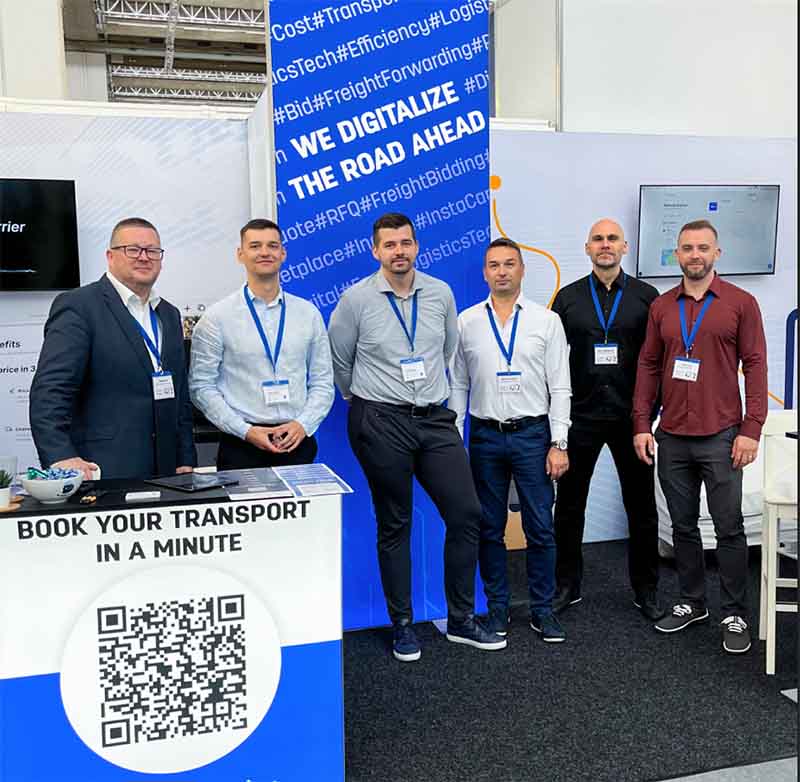SWIDA Innovative primarily focuses on express transports, within which they can solve even the most complicated forms of transport with no obligations. The company’s main goal is to make the costumers as satisfied as possible. We team up with an extensive and powerful network of premium carriers, who meet the strict conditions of the mutual cooperation.
Interview with Viktor Sučka, Founder of SWIDA Innovative.
Can you describe your company’s approach to driving innovation in product development?
Viktor Sučka: We disrupt traditional logistics workflows. Our product development approach solves real operational pain points through practical digital tools. We build for the future by observing inefficiencies in the industry today and creating solutions that are not only effective now, but also adaptable to the changing needs of tomorrow’s logistics landscape.
What recent products or solutions have you introduced, and how are they shaping the industry?
V.S: Our most transformative innovation is the AI-driven assistant layer that connects three of our core assets: Instacarrier.eu, a self-service urgent transport tool for shippers, 4shipper, a collaborative transport management platform for logistics teams, and our traditional freight forwarding business, SWIDA Innovative.
Together, these form a connected ecosystem where our AI assistant helps logistics coordinators make faster, smarter, and more cost-efficient decisions – whether they’re sourcing a new carrier, negotiating spot rates, or optimizing planning across partners.
What technologies or trends are influencing your latest innovations, and how do they benefit your customers?
V.S: We are leveraging conversational AI and automated procurement technologies to reimagine how logistics teams operate. Our AI assistant acts as a digital colleague – one that understands your transport context, reads internal communication, and proactively supports decision-making.

It suggests which carriers to invite, when to launch a spot bidding, and whether to escalate delays – all based on historical performance, urgency, and procurement goals.
The benefit for users is simple: less manual work, faster decision-making, and greater control. It’s like having a logistics expert by your side at all times – one that never forgets past data, and always works in your best interest.
How do you ensure your innovations meet both current market needs and long-term industry evolution?
V.S: We maintain direct feedback loops with our clients and partners, often co-developing features or validating concepts before launch. At the same time, we challenge ourselves to look beyond incremental improvements.
Our AI layer, for example, isn’t just a chatbot – it acts more like a co-pilot for logistics teams. It frees you from repetitive operational tasks, so you can focus your brainpower on what really matters: creating value, not chasing emails.
What challenges did you face while developing your latest products, and how did you overcome them?
V.S: One of the biggest challenges we’re tackling is connecting three different environments:
- our traditional freight forwarding business at SWIDA,
- the instant self-service logic of Instacarrier,
- the collaborative transport planning in 4shipper.
Each operates at a different rhythm – and merging them into one seamless system, supported by AI, is no small task. We’re currently building a shared backend and training our AI assistant using real coordination data, so it can learn how logistics decisions are made in practice – not just in theory.
It’s an ongoing process, but the goal is clear: make logistics smarter, more connected, and super easy to manage.
How do your latest products differentiate you from competitors in the market?
V.S: The combination of execution power (via SWIDA), automation (via Instacarrier), and collaboration (via 4shipper) makes us a hybrid solution: a digital platform with operational muscle, and a freight forwarder with intelligence built in.

Can you share any feedback or success stories from customers who have adopted your new innovations?
V.S: One of our mid-sized automotive clients recently adopted the 4shipper platform to improve how they manage spot transports. Even without AI fully integrated yet, they transitioned from manual coordination to structured bidding and better partner communication.
As a result, they reported over 40% time savings in transport planning and a 16% reduction in average spot transport costs – simply by using a smarter workflow. We’re now working closely with them as we roll out our AI assistant to make the process even more efficient.
Separately, one of our long-term clients transitioned from coordinating urgent shipments via emails and phone calls to using Instacarrier exclusively. Instead of requesting quotes manually, they now simply enter the transport details into the platform and instantly get a price. The shipment is then carried out by SWIDA, just like before – but the booking experience is now digital, transparent, and available 24/7.
How is sustainability integrated into your product development strategy?
V.S: Our main contribution is operational: helping logistics teams make better decisions faster, which leads to fewer emails, faster transports, and smarter carrier selection – all of which reduce waste in time, fuel, and effort. Additionally, we are currently exploring features that will help our clients understand and optimize their CO₂ footprint per shipment
What emerging trends or technologies do you think will drive the next wave of innovation in your industry?
V.S: We see a shift from tool-based logistics to assistant-driven logistics. Instead of clicking through 10 tabs or sending 15 emails, users will simply express what they need in a very natural language – and their system will organize it for them. The real innovation is in simplifying complexity without losing control.


